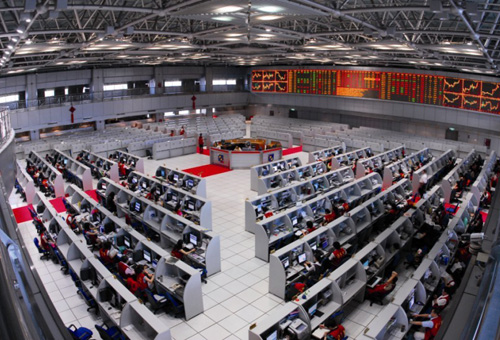
|
 |
|
Wheat futures prices in the Zhengzhou Commodity Exchange, one of the four futures exchanges in China, have been stable since November 2007 because of adequate wheat supply. [Photo/China Daily] |
Zhengzhou's advantages in agriculture mean there is more to it than electronics manufacturing.
As Zhengzhou basks in its new status as a center for electronics manufacturing, it has not forgotten its past and continues to cash in on its strong ties with agriculture.
In 2006, more than 40 percent of its population of more than 7 million lived in rural areas, and its main products included apples, cotton, tobacco and wheat. The trade in the last of these commodities has helped make Zhengzhou a recognizable name not only around China but on trading floors across the globe.
In March, the Zhengzhou Commodity Exchange will celebrate the 10th anniversary of receiving approval from the China Securities Regulatory Commission to carry out wheat futures trading.
The exchange is one of four futures exchanges in China and the most important one for agricultural produce futures. Given the importance of wheat in the food chain, it is hardly surprising that it is one of the most keenly watched commodities.
At the moment what concerns many observers are serious droughts worldwide and how these are affecting wheat prices. Although prices have shot up, Chinese experts say the wheat futures price in China, based on the Zhengzhou Commodity Exchange, will be largely uninfluenced by the external changes.
The investment bank Goldman Sachs said on Aug 3 that wheat prices were likely to rise in the coming months because of continuing dry weather in countries such as Argentina, Australia, India and Russia, Reuters reported. Chicago wheat futures have risen 40 percent since mid-June with the expansion of a drought in the US Midwest farm belt that is now the most extensive in 56 years.
China imported almost 2.2 million metric tons of wheat in the first half of this year, said the General Administration of Customs.
There has been widespread speculation that the price of wheat in China will inevitably rise, but Shi Limin, chief analyst in the marketing department of the Zhengzhou Commodity Exchange, who specializes in the wheat market, says rising international food prices will not influence wheat prices in China much.
The wheat price in China is determined by State purchase prices, which are usually set separately to what is happening in the market.
"The State purchase prices exceed the cost price paid by farmers, even though the margins are not very high," Shi said. "The prescribed prices protect farmers' interests, which is very important for China's agriculture."
The Zhengzhou Commodity Exchange says wheat futures prices in China have been stable since November 2007, helped by an adequate supply of the crop and the influence of State buying.
In January the Zhengzhou Commodity Exchange changed its rules on wheat futures trading and associated business, allowing broader wheat grading and increasing the amount of wheat available for delivery. This followed the China Securities Regulatory Commission approving changes in the futures trade of hard white wheat.
Cheng Haomin, deputy manager of Jinli Maiye, a wheat dealer in Henan province, regards the Zhengzhou Commodity Exchange wheat price as a reliable market indicator, Xinhua News Agency reported.
Cheng buys wheat from farmers at a price slightly higher than the spot price, because he can always find a reasonable price to sell it on the futures market.
"The exchange has become a haven for China's grain production," said Cheng Guoqiang, deputy director of the Institute of Market Economy at the State Council Development Research Center.
Food prices are a key element in maintaining price stability for all products, he says, and the exchange plays an important role in keeping domestic food supply and demand in balance.
The State purchasing price for wheat was about 2.02 yuan a kilogram last year.
After a trip to big wheat farms in Henan, Jiangsu, Shandong and Hebei provinces last month, the analyst Shi predicts that the State purchase price is likely to rise 0.2 yuan a kilogram later this year, a standard level of increase.
"This is the ninth year in a row that the summer grains harvest in China has grown, so the domestic supply to the wheat market is adequate."
Over the past two years wheat demand has increased greatly because more wheat is used as feed, she said.
When living standards rise, the demand for meat does likewise, which in turn calls for more feed, she said.
Corn is the main source of feed, and the increasing demand has transformed China from a corn exporter to an importer. With the high price of imported corn, people started using wheat to replace about 60 percent of the corn in feed about two years ago, reducing the cost of feed by as much as 100 yuan a ton.
"Domestic wheat started to fall short of satisfying market demand last year, and that demand is about to increase 10 million tons this year," Shi says.
Total wheat output in China is about 115 million tons a year, and demand is about 108 million tons even without being used in feed, which is almost the total trade volume of wheat worldwide.
"China is a big wheat consumer, so the world market pays close attention to Chinese wheat demand," Shi said.
"Once domestic demand outstrips supply, the international wheat price is likely to rise. A few international food trade companies have joined the Zhengzhou Commodity Exchange, such as Louis Dreyfus of France."
Contact the writers through zhaoyanrong@chinadaily.com.cn


 Washington to remain focused on Asia-Pacific
Washington to remain focused on Asia-Pacific RQFII target blue chips amid bear market
RQFII target blue chips amid bear market Australian recall for top two exporters
Australian recall for top two exporters China fears new car restrictions
China fears new car restrictions